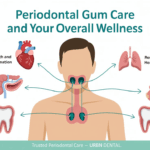It’s no secret that dental cleaning and teeth cleaning are important for maintaining good oral health and preventing gum disease. But what exactly is involved in a routine dental cleaning, and how often should you get routine cleaning? Here’s a breakdown of what you can expect from a professional teeth cleaning. We describe the professional dental cleaning steps, help you determine if you need routine dental cleanings, and offer some tips on keeping your teeth clean at home.
What Is Dental Cleaning?
A dental cleaning, also called prophylaxis or routine cleaning, is a preventative measure taken to remove tartar, plaque, and stains from teeth above the gum line. It is performed by a dental hygienist, who uses special instruments to clean teeth thoroughly. A dental cleaning is important because it helps remove deposits that can lead to cavities, gum disease, and other oral health problems.
What Is The Importance Of Routine Dental Cleaning?
A professional teeth cleaning by a dental hygienist can remove tartar and plaque that regular brushing and flossing cannot. This is because tartar and plaque can harden and become calcified on teeth, and can only be removed with special instruments. If left unchecked, plaque and tartar can lead to cavities, gum disease, and other oral health problems. That’s why you need routine dental cleanings.
How Often Do You Need Routine Dental Cleanings?
The American Dental Association (ADA) recommends that people see a dentist every six months for a professional teeth cleaning. However, some people may need to see a dentist more often, depending on their oral health. Your dentist will be able to tell you how often you should schedule a teeth cleaning based on your individual needs.
What Happens During A Dental Cleaning?
When you go in for a professional dental cleaning, the first thing that will happen is that the hygienist will take a full medical history. This will help to ensure that any medications or medical conditions you have will not pose a risk during the cleaning. Next, the hygienist will use a small mirror to examine all surfaces of your teeth. They will also feel along your gum line for any abnormalities. Once they have completed the examination, they will begin the cleaning process.
The hygienist will start by using a scaler to remove any plaque and tartar that have built up on your teeth. This process can be a bit uncomfortable, but it is important in order to prevent gum disease. After the plaque and tartar have been removed, the hygienist will use a special toothbrush to remove any remaining plaque from your teeth. This toothbrush produces ultrasonic vibrations that help to break up the plaque and tartar and remove them from your teeth.
Finally, the hygienist will use floss to clean between your teeth. This will help to remove any plaque that has made its way below the gum line. Once the cleaning is complete, the hygienist will apply fluoride to your teeth to help prevent cavities. A professional dental cleaning is a important part of maintaining good oral health. The process can be a bit uncomfortable, but it is necessary in order to prevent gum disease and cavities.
What Are The Benefits Of Professional Teeth Cleaning?
Routine tooth cleaning helps remove bacteria from your teeth. Keeping your mouth well maintained helps to maintain your dental health as well as your overall health. Good dental hygiene helps protect the teeth and gums. The following is a summary of the benefits of teeth cleanings:
- Professional dental cleaning removes plaque and tartar from the teeth, which can cause cavities, tooth decay, and gum disease.
- Routine dental cleaning removes surface stains from the teeth, making them look brighter.
- Routine dental cleaning prevents cavities, tooth decay, and gum disease by providing a fluoride treatment.
- Routine dental cleaning improves the overall health of the mouth by removing the bacteria and plaque and tartar that can cause gum disease.
- Dental cleanings can give the mouth a fresh and clean feeling.
Whiten Your Teeth
Depending on the color and texture of your teeth, the cleaning can be effective. This means that the teeth will be cleaned by an oral hygiene professional without leaving any residue on their teeth. The pigments accumulate with time if we eat highly colored foods or beverages like coffee or red wine. Smoking cigarettes can cause staining. When you remove this surface color, your teeth look more beautiful.
Improve Your Overall Health
Oral health issues can cause damage to other parts of our bodies, so keeping your teeth clean is essential for good general health. Bad oral hygiene can be associated with cardiovascular problems, like stroke and heart failure. Inhaling oral bacteria can lead to pulmonary infections. Gum disease is also associated with complications like premature births for pregnant women.
Prevent Gum Disease
Dental plaque remaining on the teeth cause a lot of inflammation in the teeth which causes gum disease. The early stages of gum disease result in red swelling of the gum tissue that bleeds rapidly. If untreated gum disease continues to develop then it can be fatal. This could result in tooth loss as well. Regular mouth cleaning can reduce dental plaque and prevent gum disease.
Routine Dental Cleaning Vs. Deep Dental Cleaning: What’s The Difference?
It’s important to keep your teeth and gums healthy, and one way to do that is to have regular dental cleanings. But what’s the difference between dental cleanings and a deep cleaning?
Routine dental cleanings are also called prophylactic cleanings or preventive cleanings. It’s a cleaning that is done to prevent gum disease. A routine cleaning is a basic cleaning of the teeth above the gum line. The dentist or dental hygienist will remove plaque and tartar (hardened plaque) from the teeth. They will also floss your teeth and polish them.
A deep cleaning is also called scaling and root planing. It’s a cleaning that is done to treat gum disease. A deep cleaning is a more thorough cleaning of the teeth, both above and below the gum line. The dentist or dental hygienist will remove plaque and tartar from the teeth. They will also clean the root surfaces of the teeth to remove bacteria. A deep cleaning may be done in one or two visits, depending on the severity of the gum disease.
So, what’s the difference between a routine cleaning and a deep cleaning? A routine cleaning is a basic cleaning of the teeth above the gum line. A deep cleaning is a more thorough cleaning of the teeth, both above and below the gum line, specifically for people with early stages of gum disease and periodontitis.
URBN Dental is a state-of-the-art dental clinic with offices in Uptown Houston, Midtown Houston, and Montrose. We offer highly-effective routine dental cleanings to help you maintain the optimal oral hygiene. Please schedule an appointment at your nearest dental clinic in Houston for a tooth cleaning.















